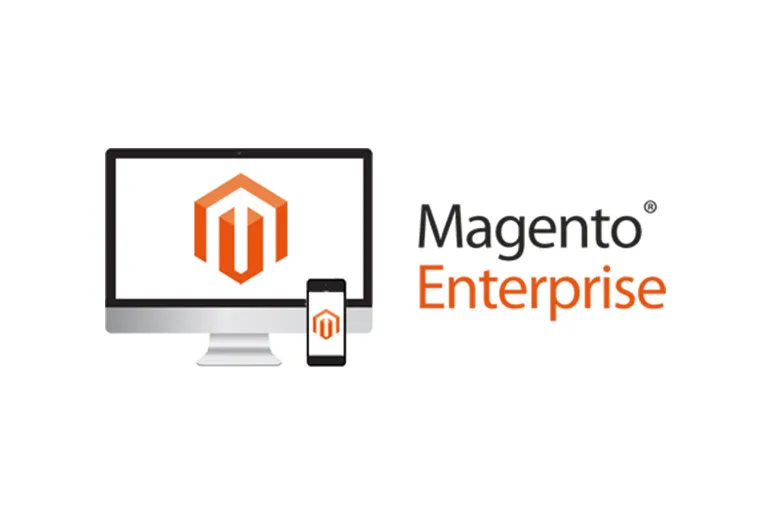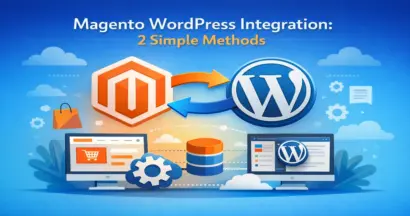Deciding between Magento Community vs. Magento Enterprise isn’t a one-click decision. Both versions belong to the Magento platform, but the choice requires careful planning, hosting considerations, and integration complexities.
In this guide, we’ll break down the key differences between the two, empowering you to select the version that perfectly fits your eCommerce ambitions.
Magento Community Edition Overview

Magento Community Edition (CE), now known as Magento Open Source, is a free eCommerce platform popular among small and medium-sized businesses (SMBs). It provides a powerful and flexible foundation for building online stores, offering a wide range of features and customization options.
Key Features:
- Free and Open Source: You can download and use the software for free, with access to the source code for customization.
- Scalable: Magento Open Source can handle small stores with a handful of products to larger businesses with thousands of items.
- Mobile-Friendly: The platform offers built-in mobile responsiveness, ensuring your store looks great and functions smoothly on all devices.
- Extensive Product Management: Create detailed product pages with multiple images, descriptions, attributes, and variations.
- Marketing Tools: Built-in features like promotions, coupons, and gift cards to boost sales and engage customers.
- SEO-Friendly: Optimized for search engines to help your store rank higher in search results.
- Payment Gateways: Integrates with various popular payment gateways for secure transactions.
- Extensive Community: Large and active community of developers, designers, and users offering support and contributions.
- Highly Customizable: With access to the source code, you can heavily customize the platform to match your unique needs.
Magento Enterprise (Adobe Commerce) Edition Overview

Magento Enterprise Edition (EE), now rebranded as Adobe Commerce, is a powerful eCommerce platform designed for large businesses with high-volume traffic and complex needs. It offers a comprehensive suite of features to manage your online store, including:
Magento Enterprise Features:
- Scalability and Performance: Handles large volumes of traffic and product data with ease, thanks to advanced caching and indexing features.
- Marketing and Promotions: Create targeted promotions, personalized offers, and loyalty programs to attract and retain customers.
- Customer Segmentation: Segment customers based on demographics, purchase history, and other factors for personalized marketing campaigns.
- B2B Features: Manage complex B2B workflows like quote management, custom pricing, and credit accounts.
- Content Management: Create and manage rich product content, blog posts, and other marketing materials.
- API and Integrations: Integrate with various third-party tools and services to expand functionality.
- Security and Compliance: Built with robust security measures to protect customer data and meet compliance requirements.
- Headless Commerce: Build flexible and scalable shopping experiences across different channels.
- Developer Tools: Extensive developer tools for customization and extension development.
Magento Community vs. Magento Enterprise: Detailed Comparison

Magento Community vs. Magento Enterprise: Pricing
- Community Edition: Free to download and use.
- Magento 2 Enterprise Edition Price: Requires an annual licensing fee based on your store’s gross revenue. Magento enterprise pricing starts at $22,000 for stores with less than $1 million in revenue and can go up to $125,000 for larger stores.
Magento Community vs. Magento Enterprise: Features
- Community Edition: Offers basic e-commerce functionalities like product management, shopping cart, checkout, and customer accounts. You can extend features through community-developed extensions, but it requires technical expertise.
- Enterprise Edition: Packed with additional features like:
- Advanced marketing tools: Personalized promotions, customer segmentation, loyalty programs, A/B testing.
- B2B functionality: Quote management, invoicing, purchase orders, account management.
- Performance and scalability: Handles high traffic volumes and large product catalogs.
- Security: PCI compliance, advanced payment security, penetration testing.
- Support: Dedicated support from Adobe and partners.
Magento Community vs. Magento Enterprise: Customization
- Community Edition: Highly customizable due to its open-source nature. Requires coding knowledge or developer resources to implement custom features.
- Enterprise Edition: Offers a degree of customization through configuration and extensions, but less flexible than CE. Requires less development effort for basic customizations.
Magento Community vs. Magento Enterprise: Scalability & Performance
- Community Edition: Limited scalability, best suited for small stores with low traffic. Can struggle with large product catalogs and high order volumes.
- Enterprise Edition: Highly scalable, can handle large businesses with high traffic and extensive product catalogs. Offers features like caching, load balancing, and performance optimization tools.
Magento Community vs. Magento Enterprise: Security & Support
- Community Edition: Lower security out-of-the-box, requires additional security plugins and constant updates. Community-driven support can be less reliable and slower.
- Enterprise Edition: High level of security with PCI compliance, advanced payment security, and penetration testing. Dedicated support from Adobe and partners ensures faster response times and expertise.
Magento Community vs. Magento Enterprise: Marketing Features
- Community Edition: Basic marketing features like promotions, discounts, and coupons. Requires additional extensions for advanced marketing functionalities, adding costs and complexity.
- Enterprise Edition: Robust marketing tools like personalized promotions, customer segmentation, A/B testing, loyalty programs, and content staging. It is easier to implement advanced marketing strategies without additional extensions.
Now, let’s take a look at the comparison table for Magento Community vs. Magento Enterprise Edition:
| Feature | Community Edition | Enterprise Edition |
| Pricing | Free | Paid (starts at $22,000 annually) |
| Features | Basic | Advanced (B2B, marketing tools) |
| Customization | High (requires coding) | Moderate (configuration, extensions) |
| Scalability & Performance | Limited | High |
| Security & Support | Lower (community-driven) | High (dedicated, PCI compliant) |
| Marketing | Basic (promotions, discounts) | Advanced (personalized, segmentation) |
Which One is Right for Your Business: Magento Community vs. Magento Enterprise Edition
Choosing between Magento Community vs. Magento Enterprise isn’t a one-size-fits-all decision. It depends on your eCommerce goals. Magento Community, free and open-source, is ideal for small businesses or startups seeking flexibility and affordability. It offers basic eCommerce features and customization options. However, you’ll need to manage security and performance yourself.
Magento 2 Enterprise, the paid version, shines for large businesses needing robust features, high performance, and dedicated support. It boasts advanced marketing tools, B2B functionality, and enhanced security. But be prepared for a steeper learning curve and higher implementation costs.
Overall, carefully evaluate your business size, budget, and technical expertise before diving in. Remember, switching between editions later can be complex. If you’re unsure, consider consulting a Magento development agency to guide your decision.
FAQs
Can I upgrade from Magento Community to Adobe Commerce?
Yes, you can upgrade your store from Magento Community to Adobe Commerce. However, it requires migrating your data and re-developing certain aspects of your store.
What are the development costs for each platform (Magento Community vs. Magento Enterprise)?
Magento Community: Development cost are lower due to the open-source nature and larger community support. However, customization can still require developer expertise.
Adobe Commerce: Development costs are higher due to the licensing fee and the need for more specialized developers familiar with the platform.
How do extensions and integrations work for each platform?
Magento Community: A vast library of free and paid extensions are available, but quality and compatibility can vary.
Adobe Commerce: Adobe offers a curated marketplace of high-quality extensions, but they generally come at a premium price. Third-party integrations are also available for both platforms.
What about security updates and maintenance?
Magento Community: You are responsible for keeping your platform updated and securing your store. Community resources and paid support options are available.
Adobe Commerce: Adobe provides regular security updates and patch releases. Comprehensive support packages are also available for ongoing maintenance and troubleshooting.
Are there any alternatives to Magento?
Yes, several other eCommerce platforms offer similar features, such as Shopify, BigCommerce, and WooCommerce. Each platform has its strengths and weaknesses, so it’s crucial to evaluate your specific needs and budget before making a decision.
Read More: 8+ Best Magento Alternatives: Hosted and Open Source Platforms
Contact US | ThimPress:
Website: https://thimpress.com/
Fanpage: https://www.facebook.com/ThimPress
YouTube: https://www.youtube.com/c/ThimPressDesign
Twitter (X): https://x.com/thimpress_com



